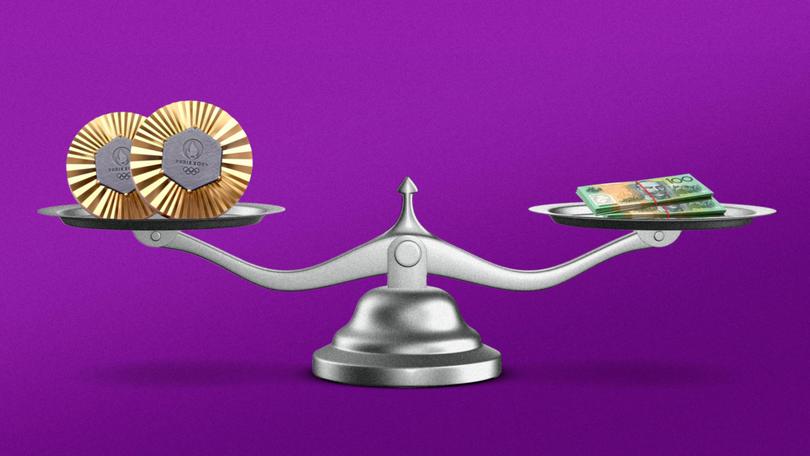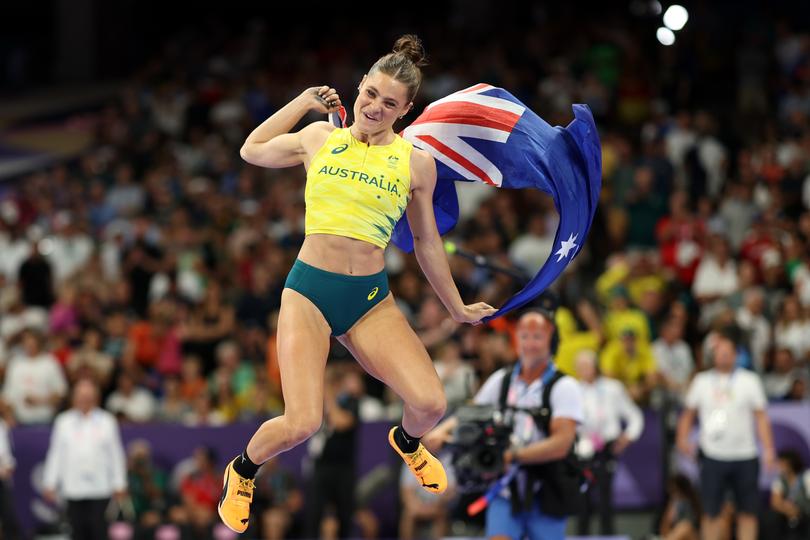MICHAEL USHER: Why we need to better support our Olympic athletes
MICHAEL USHER: We want that golden glow to last longer than two weeks. So, let’s also throw our Olympians some shares, diplomas and free degrees so they have all won gold for their future lives.

We’ve all loved watching Australia’s Olympic glory, but I often think our real test as a sport-loving nation is not how much we love our finest athletes during the games, but in the challenging months and years before and after the games.
In short, I don’t think we treat them as well at all. Or not as much as we think we do anyway, at least in terms of financial support. Chasing an Olympic dream for the vast majority of our athletes can be a hand-to-mouth journey.
For the successful few who medal, fortunes change. But that’s also dependent on the elusive X factor of the athlete and how marketable they are. It’s a cruel truth that more than a few Australian gold medal-winning athletes stepped off the podium and into shift work, still waiting for the phone to ring with juicy endorsement offers.
Sign up to The Nightly's newsletters.
Get the first look at the digital newspaper, curated daily stories and breaking headlines delivered to your inbox.
By continuing you agree to our Terms and Privacy Policy.In the years of 7-day-a-week training schedules leading into an Olympics, employment and full-time study are near impossible. The sacrifice most definitely comes at a financial cost. Scholarships, philanthropy, some government funding and fundraising — not to mention family generosity — become the bedrock of keeping of aspiring Olympians fed, clothed and focused.
Top-tier Australian swimmers have revealed that if they’re lucky, they’ll earn about $30,000 a year. That’s if you’re the best and if you stay on the team. The majority of swimmers in lower tiers are lucky to make minimum hourly rates of around twenty bucks. I’d argue a savvy law firm would have a field day with a wage theft case if they investigated how poorly our Olympians are actually paid.
Yes, there are good counterpoints to all this. Our would-be Olympians compete for country and pride and to the be world’s best. They compete in non-professional fields, so it’s a purist pursuit. But that’s looking at this problem with green and gold-coloured glasses. Everyone else involved in the 2-week Olympic tournament is raking it in. Billions of dollars in advertising, TV rights, endorsements and host city splurging. There’s not a lot of trickle-down to the athletes.
But if you win gold you’re set for life, I hear you say. You could argue, that even our gold medallists are being ripped off. The medal itself is only 6 grams of real gold plating over a mix of silver and iron. That makes an actual medal worth about $500. But I know, it’s a mean valuation or a mean way to look at a sport’s ultimate prize for its dollar value. Gold, Bronze and Silver Olympic medals are beyond value in so many ways, but my point is, once they’re hung in the pool room, or tucked away safe under the bed, how do they help our athletes earn a buck, buy a home, or advance a career away from sport?

So I’ve been thinking about some solutions, and it lies with the government. Do you know that big thing that takes a lot of hours tax and sometimes doesn’t spend it very wisely? Well, wouldn’t we all feel better if we knew our athletes are better supported? For that matter, any Australian who represents Australia at a personal cost — scientists, artists, stockmen, dancers — it’s a long list I’m sure, but for now, let’s focus on Olympic hopefuls.
How about the government look at using some of its considerable spending and assets to underpin an Olympian’s dreams? Free HECS could be a start. Wear the green and gold and get a free ticket through University to compensate for the years spent training and doing your best for the country, which then wants you to do your best chasing a career.
Or a free diploma or certificate from TAFE. A course can cost up to $20,000 which is what an Australian gold medallist receives under our medal reward scheme, so that seems reasonable. A ticket to a career post-Olympics for around the same price as a Gold medal bonus payment.
The enormous Commonwealth Future Fund could be tapped to offer a parcel of superannuation shares or investments for any of our 486 athletes competing in Paris. Doesn’t have to be much but a kick-starter for safeguarding long-term financial security could be a handy reward.
How about a share or a stake in the new venues for Brisbane 2032 games? Federal and state governments are spending billions on that, so carving off a small holding in any of those projects over time might be a reasonable investment in an athlete’s future. Our athletes as shareholders in major government-backed projects could be a whole new way forward.
I’m sure there’ll be a million reasons why all these ideas would cause a few bureaucrats and government types to spit out their chai lattes, but my point is, in this day and age there must be some more creative and lucrative ways to help full-time athletes representing Australia, secure a better financial future than just. These may sound like ‘out there’ ideas, but why not look at a different way to secure our athletes’ future and shake up the old funding models, which are always so exposed to the politics of the day?
We want that golden glow to last longer than two weeks of the Olympics. So, as we throw ticker tape at the welcome home parades, let’s also throw them some shares, diplomas and free degrees so they have all won gold for their future lives.
